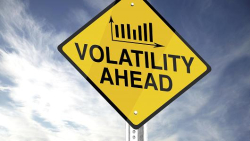
The market is going down for a reason. Interest rates are rising. Money is costing money again. Thanks to $2.5 trillion added to the deficit, mainly because of the Trump tax cut, we’ve got inflation, and bond yields are up.
Higher interest rates are good for some people. Baby boomers are at the front of that line. It means you can sell the government your money and get income. On a 30-year government bond, that’s a yield of 3.16%.
Baby boomers, with say $1,000,000 in their retirement accounts, can sell out to the government and have a guaranteed income of over $30,000 per year, which along with Social Security and Medicare is a pretty sweet retirement. There are 4 million boomers retiring every year, those who put retirement money into stocks have that kind of dosh, and it’s a happy ending all around.
But just wait a minute. Interest rates aren’t going to stay here. They’re going to continue going up, to 4%, to 5%, to 6%. They could double this year, because the Chinese don’t want our bonds, and the Saudis don’t want our bonds, and the Europeans won’t want our bonds, because the value of our currency is going down, 10% just in the last year.
All this is being done in the name of growth, and 3% growth is here, but it was here before inflation. Businesses are anxious to hire people, but they’re running out of people to hire, and Trump won’t import any new ones.

When interest rates and inflation are rising, it’s bad for dividend stocks, and for stocks whose growth – in both revenue and profit – doesn’t exceed the inflation rate. In short, bad for most stocks. During the 1970s, the last time inflation and high interest rates dominated the economy, the Dow Jones Industrial Average dropped by about one-half. One half!
The same could happen here, only faster, but for one important point. Deflation, like the Dude, abides. Technology is naturally deflationary. Cloud costs keep going down, and there is something like a Moore’s Law of Software, in that once software costs are paid for its use becomes free. Open source accelerates this raising the line of what is “free,” as new software keeps being built on a higher base.

But bigger clouds can model all that. We have now begun the process of decoding life, and of decoding Gaia. It’s an exciting time to be a scientist. I wish I’d become one. I wish I were young enough to become one. I’m proud that both my kids have found their way into STEM careers.
The economic point is that all this is deflationary, that this deflation impact is constantly accelerating, and that the present inflationary period also has a definite sell-by date. At some point we’re going to see that both tax cuts and spending hikes are sides of the same coin, they’re both ways to redistribute the vast amounts of new wealth created by deflation, and that spending hikes create a bigger market leading to higher growth than just adding to the store of capital. That understanding will be a political turning point, but you can’t invest on it until it starts to happen.

That is the lesson that will be learnt, first by voters and only later by politicians, over the next three years.












Bureaucracies are inflating exponentially, probably what brought down the Roman empire and many previous civilizations. Many of those civilizations fell quickly too. Sometimes even writing was lost. There is no public to appease when you are battened on to a good bureaucratic career / sinecure. Information apathy is also a factor here.
Bureaucracies are inflating exponentially, probably what brought down the Roman empire and many previous civilizations. Many of those civilizations fell quickly too. Sometimes even writing was lost. There is no public to appease when you are battened on to a good bureaucratic career / sinecure. Information apathy is also a factor here.